Dianne E. Butts's Blog: Dianne E. Butts' Blog, page 4
October 1, 2015
Which Rights are Right to Buy for Your Compilation? - How to Write a Compilation - Part 4
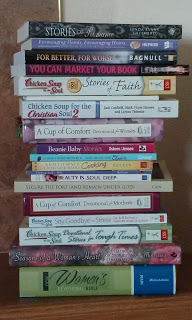 These are some of the compilation
These are some of the compilationbooks Dianne has contributed to.I received a follow up question from Pierre (who started this whole series with his question on how to write a compilation). He asked me about the "rights" to the stories that we, the one who is putting together the compilation, purchase from the writers who contribute. (Tweet that!) So this month let's talk about "rights" to your written work.
This will apply not only to authors heading up a compilation project but also to writers who write for magazines, compilations, or other short works. (Tweet that!)
First we will talk about each type of rights. Then I will talk about how this right might apply to you in the context of gaining permission to use other authors' written stories in your compilation books. (Tweet that!)
Disclaimer: I'm not an attorney. What follows are my own understandings and unofficial definitions of the rights to our written pieces as we sell them to publishers (or purchase / obtain them as a publisher) based on my own research and work experience. You may want to consult an attorney. Other people may have different opinions. If you're writing a compilation, make sure you clearly communicate what you intend to purchase or obtain in your contract with writers.
For rights to your entire book manuscript when you are ready to sell it to a publisher, it would be best to ask someone with more experience in that area.
First Rights:
The right to publish a piece first . Offered to one publication exclusively because only one place can publish it first. You can only sell First Rights once. Often publishers pay more for first rights. Sometimes seen as: FNASR which stands for "First North American Serial Rights." This includes the United States and Canada. If you sell FNASR it's possible to sell first rights again to a publisher outside of North America (Europe, South America, Australia, etc.).
If you are obtaining stories for a compilation book, you need to decide if you want only material that has never before been published. Is it necessary that you be the first one to publish this piece? Or are you willing take already-published material? Make a decision and go with it.
Consideration the overlap of your audience with the audience of wherever they piece has been published before. What are the odds someone has already read this? If that chance is small, why not take previously published material? You'll have more writers able to send you material if you will accept "Second" or "Reprint" rights.
Second Rights:
The same as Reprint Rights. The right to publish a manuscript that has already been published, after it has appeared in another publication. Usually understood to be a simultaneous submission, although some markets accept reprints but not simultaneously. Savvy writers should specify on their manuscripts if they are submitting simultaneously.
If you are obtaining stories for a compilation book and are willing to take previously-published material, state in your guidelines that you will accept "Second" or "Reprint" rights.
Note: Even if a written piece has sold two, three, four times or more, these are still called "Second Rights."
Reprint Rights:
The same as Second Rights. See above.
One Time Rights:
The right to publish the work one time . This may (or may not) also be the first the time the piece has been published, so if it has not been published before the first rights will also be gone.
If you are obtaining stories for a compilation book, think about if you will want to use the same material in another project? If you might, you don't want to obtain One Time Rights. If you do think this is the only time you'll publish the material, this might be the way to go.
You don't need to pay more if it is the first time it is published. You're buying or obtaining the right to use the material once , in your compilation book. It doesn't matter to you if it's the first time the piece has been published or not. If you want to use the material again somewhere down the road, you'll have to go back to the author and ask them for more rights.
Simultaneous Rights:
This means the writer is offering the same piece to more than one publisher at the same time. It is not exclusive rights to anyone. Usually these are reprinted materials.
Savvy writers should inform all parties involved that the piece is being offered elsewhere at the same time, however they are not required to give you a list of the other publications.
If you are obtaining stories for a compilation book and you feel you need that information to know if your audience might overlap with another publication's audience that might publish it at the same time, ask the writer where else it has been submitted. Writers should not refuse to give that information if asked.
Writers often offer simultaneous rights for timely manuscripts that will be out of date soon, such as breaking news stories. However at times it is simply a way of speeding up the submission process to offer the piece to more publishers and get more pay checks, which is certainly understandable from the writer's perspective.
All Rights:
Just what it says: you would be purchasing or obtaining all rights to the piece.
This means you will basically own it as if you had written it. The writer will no longer have any right to it at all.
You would be able to reprint it as often as you like, use it in other books, and do pretty much anything you want to with it, all without paying the writer anything more and never getting any more rights.
Sound good? Think again. I advise writers to NEVER sell All Rights.
Most writers make precious little from their written pieces they sell. So writers need to sell their work again and again. This means that if you are going to insist on obtaining All Rights to any written piece, savvy writers are going to be reluctant to work with you. You're going to have a hard time filling your compilation. And you're not going to have happy writers.
Think it through. Do you really need all the rights? Why? It may be good for your book and your sales if your authors do sell their stories elsewhere. You can ask them, as a courtesy if they sell their piece elsewhere please tag it with the words, "This story first appeared in [Name of Your Compilation]." Viola. You just increased your exposure of your book exponentially. See what a smart compilation author you are?
Work for Hire:
This is when you, as the publisher, come up with an idea and hire a writer to write it. It's your idea – and you own it. The writer is usually paid a flat fee, not royalties. All Rights then belong to the publisher (you).
If you have stories you need written for your compilation, you can hire a writer to write it for you. Make sure they understand you will own all the rights to it when they are finished. Put that in writing and get their signature. A lot of writers make their living doing work like this, so it's a win / win for you and them.
Electronic Rights:
If you plan to make your compilation book an electronic book (e-book), make sure you put that in your contract.
The important thing is know what rights you are buying or obtaining and that you make sure you clearly communicate that to the writers, put it in writing, and get their signature on it. (Tweet that!) It may be very wise to consult an attorney. Then you can move ahead with your compilation book with confidence.
Published on October 01, 2015 02:00
September 1, 2015
How to Write a Compilation - Part 3
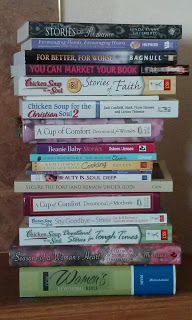 Dianne has contributed to all
Dianne has contributed to allthese compilations
(and more).In this part 3 of my "How to Write a Compilation" we'll talk about the legal issues including the contract you'll need to create for your contributors to sign, then a little about publishing your compilation book, marketing your book, and keeping the whole project organized.
I've also received a follow up question from Pierre (who started this whole series with his question on how to write a compilation). He asked me about the "rights" to the stories that we, the one who is putting together the compilation, purchase from the writers who contribute. I know I said last month this would be the third and final post on how to write a compilation, but now I'm thinking next month we should talk about "rights." This is apply not only to authors heading up a compilation project, but also to writers who write for magazines, compilations, or other short works,
At the very end of this post you'll find descriptions of what's in Part 1 and Part 2 of "How to Write a Compilation" plus links to those blog posts.
Legal
You are going to need some kind of written agreement between you and your contributors to your compilation book. You need to have this agreement in writing. You're going to have to create your own agreement because nobody else is going to do it.
When I did my compilation, Deliver Me , these stories were very personal and private. I had to make sure nobody was sharing someone else's story who would sue me! Hiring a lawyer was not the answer in the beginning because a lawyer doesn't know what I needed for a publishing contract.
Luckily for me I had contributed to many compilations and had signed a contract for nearly every one of them and so I had those samples to work from. I "copied" the parts out of several and tweaked them for my needs. Once I had my agreement the best I knew how to make it, THEN I hired a lawyer to go over it for me. I explained to her what I was doing, explained the added privacy issues involved, and asked her to make sure my contract covered me well so I wouldn't get sued. It cost me a little (a couple hundred $ if I recall accurately), but I felt it was well worth it for that project. And I have not had any problems. Of course before the contract I communicated clearly with every author individually making sure they understood this was going to be published so anyone could read it. Did they have permission to share the store from anybody referenced in their story? Are they sure it was going to be okay? They were all eager and adamant about wanting to share their stories. So when the contract came there were no surprises.
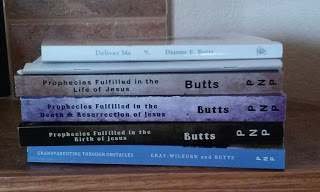 These are Dianne's six books.
These are Dianne's six books.The one on the top (Deliver Me) and the one on the
bottom (Grandparenting Through Obstacles)
are compilations.By the way, for those who wrote "as told to" stories for other people, I not only had the writer sign the contract, I also required that they, the writer, get their interview subject to sign it as well. In some instances I needed several signed agreements for one story. Don't be shy about doing this. I had to make sure I had permission to use the story and I had to have that permission in writing. A "verbal" agreement just won't do for something so vitally important. Taking such care has served me well and you should take such care with your compilation.
About privacy:
Every time I write about private issues, and every time I work with someone else who is writing about deeply personal stories or issues, the question comes up, "Should I share that part or not?"
Here's my personal rule: Ask yourself (or the writer or person): "Do I/you feel ANY hesitation or reservation at all about sharing this? For any reason? "
If the answer is yes, DON'T SHARE IT. The reason for this is because once it is published, you can't get it back. It's out there. Even more so in our age of the internet. So if you have ANY thought that maybe you shouldn't say that, don't.
If later you change your mind and become certain you want to share this story (or this part of a story), there will be future opportunities to share it.
However if you, or they, share it and then change your/their mind and wish you hadn't, it's too late. You can't undo that any more than you can un-ring a bell.
Always remember PEOPLE are more important than the PROJECT. Remember people are your priority, not the project, and you'll do fine. (Tweet that!) I would rather give up the whole project than irreparably hurt one person. Honor the people involved and most often they will honor you. (Tweet that!)
Get Permission in Writing
Some of my original stories I had for Deliver Me were amazing. However it took so many years to see the book to completion that I lost contact with the persons involved with those first stories. The phone numbers and email addresses they'd given me were no longer good. I could not get the signed permissions I needed, so I had to scrap the stories. This made me very sad, but I simply could not use the stories without permission, and without that permission in writing. Don't fudge on this. You'll be in trouble if you do.
The rule here is:
No signed agreement? No published story in the book! (Tweet that!)
What to Include in Your Written Agreement
Please understand I am not an attorney and this is not legal advice. I'm only offering a little help from my own experiences. You need to seek out whatever professional you need to help you with your project.
In general, here are some of the topics to address in your written agreement with your writers:
Rights. Which rights are you buying and which rights is the writer selling? Do you want to use the story exclusively? Or is it okay with you if the writer sells it elsewhere also? Do you want to use the story FIRST? What if the writer sells it elsewhere and it is published there before your book comes out? Payment.That their story is not infringing on anyone else's rights, etc.
Just a note: On the cover of my Deliver Me book it says "edited by" and then my name. My cover designer did that and I didn't object. You can call yourself the "author" if you want, even if you didn't write everything in the book. Technically, that's what you are, I believe. (Others may have another opinion possibly.) You can call yourself the editor as I did, because you're surely going to go over every story and edit it for your own tone and theme and corrections. (Minor edits like this are okay, but you should never change the meaning of what the writer wrote without them knowing an approving the changes. Don't "enhance" the story, etc.) Or you can call yourself the compiler: "Compiled by...".
Staying Organized
By now you have your writer's guidelines going out and hopefully submissions coming in. You're picking the stories you want to use and you need to make sure you communicate with each writer about all the contract details. You have to answer different questions from each one. You may have asked for edits or changes to make some stories better. And you won't want to miss getting a signed agreement. In other words, you have a lot going on and you need a way to keep track of everything.
I made a checklist for everything I needed per story: contract/permissions, bio for the back of the book, name that goes on the byline, mailing address where I was to send the contributor's copy and check, etc. Then I made a notebook with a divider for every story. I put a checklist behind every divider. Then I checked things off as they were done. When the signed contract came back I 3-hole punched it and put it in the notebook. (Tweet that!) I have those notebooks to this day in case there is ever a question about permissions or contracts or anything else.
As a sample I'm sharing sharing my actual Contributor Checklist that I used for Deliver Me here as a sample:
Dianne's Contributor Checklist in PDF
Publishing
You may want to publish your compilation book independently or you may want to try to interest a traditional publisher in it. That's a whole discussion in itself which I talked about in my January 1, 2014, post here:
What You Need to Know about Book Publishers BEFORE Publishing Your Book
Marketing
As with any book don't forget to plan how you're going to market your book.
Try to get your contributors to help you market the book, but don't expect a lot. (Tweet that!) It's your baby, not theirs, so you're the one that will best champion your baby to the world. But here are some ideas:
Brainstorm ways Contributors can market the book. Make a list and provide it to them. Be careful not to be overwhelming. It might be better to give a short list regularly than a long list all at once.Maybe start with small circles and work outward, meaning start with the contributors' families, then their towns, then their circles of influence (organizations, ministries), then nearby cities, then their states, etc.Maybe create opportunities that they can jump on board with as their schedules allow, such as a Facebook Event or a Goodreads Event. If your contributors are in your area, or are where you'll be on vacation, maybe you can organize a get-together or an in-store author event book signing. (For help with your in-store author book signing event, see my newest e-book for writers called Book Signings ).
Final Thoughts:
Look at other compilations for examples of all these various items discussed here, including Writers Guidelines, how the book is organized, etc. One very successful series of compilation books is, of course, the Chicken Soup for the Soul books. Learn more about them at www.ChickenSoup.com.
That's all I can think of about writing and organizing compilation books. If you have a question that I didn't address, leave it as a comment below and maybe together we can discuss an answer for you.
Have you put a compilation together? Or have you contributed to one? Tell us about it in a comment. I hope this has inspired you to create your own compilation.
Good luck and let us know how it goes!
Related Articles:
How to Write a Compilation - Part 1: Includes what a compilation book is, how to write a compilation and options for who writes the stories, asking writers to contribute, and creating writer's guidelines for your compilation and getting them out there where other writers will find them.How to Write a Compilation - Part 2: Includes how to organize your compilation and paying your writers.
Published on September 01, 2015 03:00
August 1, 2015
How to Write a Compilation - Part 2
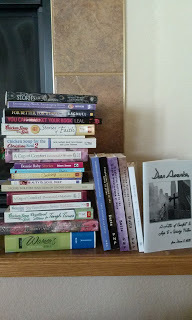 Dianne's books on the right,
Dianne's books on the right,and a stack of most the compilation
books she's contributed to.Last month we talked about what a compilation books is, how to write a compilation and options for who writes the stories, asking writers to contribute, and creating writer's guidelines for your compilation and getting them out there where other writers will find them.
This month we'll talk about how to organize your compilation and paying your writers. (Tweet that!)
How to Organize Your Compilation
If you don't already have an idea of how you're compilation is going to be organized, I'm thinking it will tell you as it develops. For both my Deliver Me book and Grandparenting Through Obstacles, which I did with my co-author, the stories kind of grouped themselves around common themes which became chapters. In our grandparenting book, we also had "Parts" in our book instead of chapters. We had 20 stories in 4 Parts on a theme with five stories in each Part.
For my Deliver Me book, I knew I wanted stories about women choosing to keep her child, give for adoption, those who opted for abortion, and stories from men, so I knew I would have chapters for each of those topics and I went looking for stories to fill them. Other chapters emerged as stories came in that surprised and intrigued me.
I'm not sure about this, but I think creative projects have a character of their own and so they will tell you how they need to be organized. That might mean you look at what stories you have and see a common thread and so you group those into chapters.
Paying your Writers
Some compilations "pay" the writers by offering a free copy of the book. I believe writers ought to be paid for their work. (Tweet that!) We seem to be about the only profession where we are expected to work for free, which I think is wrong. Workers deserve their wages.
For Scripture says, "Do not muzzle an ox while it is treading out the grain," and "The worker deserves his wages." 1 Timothy 5:18
But at the same time I'm suggesting that should pay your writers, you also need to know that anything you do pay them is going to come out of your pocket. (Tweet that!) This means even if you find a traditional, advance and royalty-paying company to publish your book, they are not going to also pay your writers. You will. Or you can use your advance to pay them, but it's still coming out of your advance. So you need to count the cost carefully as you make decisions about whether or not to pay your writers, how much, and in what way.
Most of the compilations I've written for pay a one-time fee. I've been paid anywhere from $20 to $200 for one of my stories. (Tweet that!)
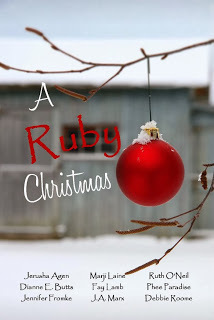 A Ruby Christmas
A Ruby ChristmasA fiction compilation -- each chapter
written by a different authorAnother way to pay your writers is to share royalties. I'm involved with one project like this. This particular book is not pictured in my stack of books because it's in ebook form only so I couldn't put it on my stack of printed books.
The publisher gathered a group of known writers/friends. We each wrote a chapter and each receive a percentage of the royalties. This is a fiction project. Again, count the cost of the paperwork needed to track and share royalties so you don't create a bookkeeping nightmare for yourself.
How much should you pay? Just to give you an idea, I paid $20 per story for one book and $25 per story for the other. But even a token amount, like $5, is better than nothing.
I paid on publication (meaning no money went out until the book actually existed). Then I mailed their check in the same package as their contributor's copy of the book.
A few of my authors wanted to "donate" their story and never cashed the check. That was generous of them and it helped me out with the expense of my book, but I still honored my writers by offering them their pay.
Author Discounts
I also offered my authors discounts when they purchased copies of the book. (Tweet that!) With the book another publisher published, I negotiated so that contributing authors were able to buy copies at a discount. Our contract with the publisher was a percentage share of the profits, so we were to get a share of the difference between the cost plus publisher's percentage and what the contributors paid, which was less than when a buyer bought a book at full price but still a little for me and my coauthor.
Is this fair to the contributors to have to buy at more than cost? Yes, of course. You're the one who did all the work of putting it together, took all the risks, put in all the time, found the publisher (or published it yourself), etc. That deserves being paid a small portion per book purchased by the contributors. If your contributors can purchase at 50% off the cover price, they make their money when they sell copies, and that's standard. Almost all the compilations I've written for sell to contributors for 50% off the cover price.
One book I was in didn't give the authors a 50% discount but only one dollar off the cover price. Why should I buy a quantity and pay shipping for $1.00 per book?! It wasn't worth it.
Contributors Copies
Give all contributors one free copy of the published book as a "contributor's copy." They deserve to get one.
I contributed to one compilation that did not do this. To this day I have not seen this book with my own work in it. I would have had to purchase my own copy. This is a bad way to treat your contributors. How can I champion your book when I haven't seen it, can't hold it in my hands, look at it, read the rest of it? How can I help you market it when I can't take a photo of me with it for Facebook and Instagram, or put it in my stack to photograph for my blog?
For goodness sakes, plan to give every contributor at least one copy. Be generous. (Tweet that!) This will cost you: both in purchasing the printed copies as well as in mailing/shipping them to your contributing authors. Count the cost of that as well. (Of course we all think we'll sell enough books to cover all our costs and make a profit. Authors typically over estimate how many books we will sell.)
Next month in the third and final part we'll talk about the legal issues including the contract you'll need to create for your contributors to sign, then a little about publishing, marketing, and keeping the whole project organized.
Related Articles:
How to Write a Compilation - Part 1
Published on August 01, 2015 03:00
July 4, 2015
How to Write a Compilation - Part 1
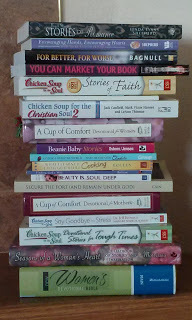 Dianne E. Butts
Dianne E. Buttshas contributed to all these
compilation books.
(and more!).Please excuse me for being a little late posting this month. I was enjoying a fun and wonderful family vacation and just couldn't get it done earlier!
Last month I received a message from a reader, Pierre, asking, "Do you have any articles on how to write or organize a compilation?" (Tweet that!) That's a topic I haven't approached here on the blog so thanks, Pierre, for the topic suggestion.
I've contributed to twenty compilations, all of those in the photo and a few more not pictured. I've also put together a compilation myself and another one with a co-author. (See photo below.) So I’m sharing what I've learned from those experiences.
When I brainstormed the answer to Pierre’s question and what I’ve learned about writing compilations and/or writing for them, I was surprised by how much information I came up with. So much, in fact, that I’m going to divide it into more than one post here (or else this post would be dreadfully long!).
Here’s how my plan is currently shaping up:
In this first post, Part 1, I’ll answer the first part of Pierre’s question of how to write a compilation which will include creating writer’s guidelines and getting them out where other writers might see them.
In Part 2 I’ll answer Pierre’s question of how to organize your compilation plus we’ll talk about paying your writers, a topic that is of great importance to me.
In Part 3 we’ll look at legal considerations, keeping the whole project organized, and marketing the finished product.
So let’s get started with:
 A Ruby Christmas
A Ruby Christmas
a fictional story compilation.What is a Compilation?
A compilation is a collection of stories--whether true or fiction--or essays or poems or other written material all bound together in one book.
Most of the compilations I've seen are nonfiction. They are often centered around a particular topic.
But a compilation can also be fiction, whether it's a collection of individual complete stories or perhaps different writers contribute a chapter to the same story, such as the one I contributed to titled A Ruby Christmas .
How to Write a Compilation
You can do some of the writing yourself. You can ask other writers to contribute to your compilation. Or more likely you'll end up doing a combination of both. That's what I did.
Write Part or All of the Compilation Yourself.
If your compilation is all about a collection of material from established writers, then they obviously will want to write their own material. But when I did my compilation, I wanted stories about unplanned pregnancies and all the different decisions people make and how that played out in their lives. For the compilation I did with a co-author, we wanted stories of grandparents finding ways to share the Gospel of Jesus Christ with their grandkids. With a compilation topic like this, not everyone you're working with is going to be a writer. Some have no desire, skill, or time to write their stories down on paper. But they have great stories! So the solution is to do the writing for them. You interview them and collect their story details, and then write it as an "as told to." You'll see several of these in my Deliver Me book.
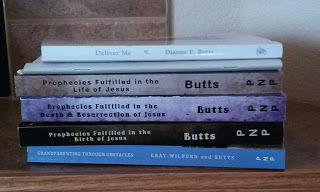 These are Dianne's six books.
These are Dianne's six books.The one on the top ( Deliver Me ) and the one on the
bottom ( Grandparenting Through Obstacles )
are compilations.
Doing this will assure you of many great stories. It will also assure the quality of writing you want for your book. If you can't do the interview and writing, you can find (or hire) a willing writer and assign them that story.
I consider writing others' stories one of the great privileges of being a writer. (Tweet that!) So many people have amazing stories that would help and inspire others but they do not have the skills to write them or the platform to share them if they did. (Tweet that!) So helping them share their stories is an incredible honor and blessing to me, not to mention my readers. (Tweet that!)
When you write an "as told to" story for your compilation, simply treat the person with the story as any other author: get the same permission to use the story, have them sign the same agreements. Put their name on the byline followed by "as told to" and then your name. Consider them a contributing author because they are the"author" of their story even though they didn't do the work of actually putting it on paper (or in the computer).
Ask Writers to Contribute
If you plan to ask other writers to contribute to your book, first you need to be able to articulate very clearly the idea of your compilation and what you are looking for in submissions. I always found this interesting because I thought I was being clear but writers would have completely different ideas of what I meant. So I would have to continually clarify. The problem is they are not in your head, so all they know about what you're thinking of for your compilation is what you tell them. Therefore:
Be as clear as you can be. Be willing to clarify your vision when needed. And be patient when working with other writers.You may have to answer the same question(s) over and over. Count this as a great learning experience because you'll get a clearer picture of how you're coming across as a writer and how your reader understands you. (Tweet that!)
Create Writer's Guidelines
You'll need to create some writer's guidelines, just like the professionals do. Because you are a professional.
As an example which may be helpful to you I’ll share the writer’s guidelines I created years ago for my book Deliver Me, but please know this opportunity is now closed and this is intended only as an example or a starting place for you.
Better yet, gather some writers guidelines off the internet from magazines or other compilations and use them as a starting point.
Besides sharing your vision you'll want to give:
An idea of what you’re looking for in stories you’ll accept. Tone. How long you want each story (in word count).Which rights you want to purchase.Compensation (what you'll pay in $ and/or contributor's copies).If you want a bio for the back of the book (a great perk for writers) and the word limit on that.How and where to submit.Your deadline.
Get the Word Out
Once you have the writer’s guidelines for your project written, edited, and polished, make them a printable PDF document.
Then post your guidelines on your web site, blog, and/or Facebook page.
Once you have your writer’s guidelines available somewhere online, you can link to them in Twitter messages, on Facebook, at LinkedIn, in your emails, in your newsletters, etc.
Ask your friends and writing acquaintances to share them with their circles of writer friends.
You can also seek out web sites that writers frequent that want to post opportunities for writers and politely ask them to post or link to your project’s information and your guidelines.
So this month why don’t you consider gathering some of your writer friends, reaching out to other writers you know, or possibly extending the invitation to friends of friends and talk about doing a compilation together? Brainstorm your idea, then brainstorm your writers guidelines.
Then come back next month and we’ll talk about how to organize your compilation and about paying your writers.
Published on July 04, 2015 12:49
June 1, 2015
How to Get Unstuck When You're Stalled In Your Writing (Beating "Writer's Block")
 iStock © alvarezThis month I'm wondering who needs this article. (Maybe it's you. Maybe it's me!) Have you ever been stuck or stalled in your writing? Have you ever experienced "writer's block"? Here are some thoughts to help.
iStock © alvarezThis month I'm wondering who needs this article. (Maybe it's you. Maybe it's me!) Have you ever been stuck or stalled in your writing? Have you ever experienced "writer's block"? Here are some thoughts to help.This is a rerun from my former newsletter from August 2010. It's a timeless topic and I know there's help here for someone who needs it. Maybe that will be you, if not now...then perhaps another time soon.
Getting Unstuck When You're Stalled
I had conversations with two different writers recently. Both talked about being stalled or blocked on big projects. We talked a little about why this might happen and what we can do about it when it does. (Tweet that!)
One fellow, when he learned I was a writer, asked me, "How do you get past writer's block?" (Tweet that!) He has a large project in mind and he's looking for help in getting it done.
As I tried to talk with this writer, he did a lot of talking and very little listening. He lamented that he couldn't get anything done. He was frustrated that he couldn’t get anyone interested in his project.
I asked him what he had written so far. He didn't answer, but went on about how the people in charge who should want his project wouldn't get on board with him. Hmmm. I began to wonder if this fellow has ever actually written anything.
What is Writer's Block?
Sometimes I think would-be writers try to write, find it extremely difficult, and conclude they have writer's block.
I’ll make a confession here that I've never made out loud before because I have the impression it could possibly be quite controversial. Here it is: I don’t know what writer's block is. (Tweet that!)
There. I said it.
Years ago I remember reading an article in a popular writer’s magazine where the author stated he didn't think writer's block existed. Oh what an uproar ensued! I was stunned such a statement would elicit such a strong, negative response! I'm still not sure I understand why. I just know a lot of writers were offended.
I've heard writers say when they are blocked they "can't" write. Okay, maybe so. I've never experienced that so I won't claim to understand it.
What I have experienced is that writing, for me, is really, really hard. (Tweet that!) It's work. It never comes easy.
I've heard some writers say their words flow so easily onto paper. Well, lucky them, I guess. For me, it's hard, physical labor to get my ideas out of my head and onto paper. I can say that I've had enough practice now that it's easier. I now understand my own process I must go through to get it done. But it's never easy.
Writing is clear thinking.
If you can't think a thought or idea clearly, then you can't nail it down on paper. (Tweet that!) Getting to the point of being able to clearly state what you're thinking is hard work. (Tweet that!)
I have to wonder if that writer who told me he was blocked really was blocked. Or did he discover how difficult it is to write and conclude something else was wrong?
What to do about it.
Recognize writing is hard.
If you're blocked or feeling stuck, the first thing to do, I think, is to recognize writing is very difficult. If it wasn't, everybody would be doing this. (Tweet that!)
Clarify what you want to say.
The next thing I would suggest is to clarify what it is you want to say. Remember that exercise we're told to do? Say it in one sentence.
Whether it's a book, an article, or a short story, say it in one sentence. If you can't, it's not clear enough yet in your own mind to nail it down on paper. (Tweet that!)
It will take time and effort and a hundred (or a thousand) failed tries before you're able to say it in one sentence. (Tweet that!) That's just the way it is. But once you start getting close, you'll sense it. And once you nail it, you'll know it. So don't quit prematurely.
Say it in one sentence. Just do it. Now.
[For help writing this one sentence, visit the December 2014 post, "Keep Your Eye on the Ball: One Sentence that Can Elevate Your Writing to New Heights."]
Some suggestions...
The second writer I talked with I know to be an accomplished writer. She said she was burned out. Boy do I understand that. She works a lot on other people's projects and really wants to work more on her own, but she's not getting going on those.
I asked her, "What's your passion?" She thought for a moment before she told me about a project she has wanted to write for years. But it's too big, she said. She doesn't know where to start.
We talked about some things she could do. Here are some of my suggestions:
Break it down.Figure out what you need to do. Make a list. List the items that would need to be done to accomplish (or even start) this project.
Make a plan.Work the plan.Do what you can. By the time you get to some of the things that can’t be done, you will have found the help you need or a way to do it. Start with doing what you can. The rest will work out.
Remember your passion.
And whenever you’re feeling burned out, stalled, or stuck. I suggest this:
Return to your passion.I think as writers we're asked to do more and more to please publishers, all with lower and lower pay. Or no pay. We're expected to start a blog, be a public speaker, market online, attend conferences, write on spec, take assignments… No wonder we’re feeling burned out, overwhelmed, and stalled.
But I fear that's a topic for another article. For now, ponder these questions:
Why did you start writing? Or why do you want to write?What is your passion? What topics, projects, or type of writing are you passionate about?Are you working on what you're passionate about, or have other projects taken over and crowded out what you really want to be writing?How can you take steps to return to what you wanted to write when you started, to those projects you're passionate about?
There you have it. Get reconnected to your writing passion and takes steps to get back to that. I really believe when you do, you'll get unstuck.
* * *
I hope this rerun article has helped you get unstuck if you're stalled in your writing. If you're experiencing writers' block, I hope you've found some help here to beat writer's block.
If you would like more help with your writing, check out my ebooks for writers here: How to Get Published by Magazines & Book Publishers Cutting the Passive Voice -- Only $ .99!Have a print book out? You need Book Signings !
By the time we meet here again next month, I'll hope you're well on your way in writing your passion and your dream project! God bless you and your writing.
Published on June 01, 2015 03:00
May 1, 2015
Writer's Conferences: What Should I Prepare to Take? What Should I Expect? What Should I Do There?
 Colorado Christian Writers Conference
Colorado Christian Writers ConferenceEstes Park, ColoradoA few weeks ago on my Facebook Author Page, we were talking about preparing for a writer's conference. If you've never been to one before, I bet you have a ton of questions. I know I did when I first started going to these, which was more than 25 years ago. I've been to at least one each year since then, so I've accumulated a lot of experience I can share from.
As "conference season" begins (if there is such a thing), I thought it might be helpful to give you some ideas of what to expect, how to prepare, what to take with you, and what to do while there. (Tweet that!)
What to Expect
You can expect to find a lot of like-minded people, writers who think they are the only ones with a passion to write. Writers who think they are not "really" writers, but everyone else in the room is. (Is that you too?) (Tweet that!)
You can expect to meet published authors and unpublished authors. There will be freelance writers (freelancers aren't on staff at any publication but write for a variety of them).
There will often be representatives of book publishing companies, editors from periodical publications such as magazines and web sites that take material from freelancers, and often literary agents will be there. Some or all of these may be on faculty teaching workshops or speaking at sessions for all the conferees.
You may be able to schedule meetings with these publishers, editors, and/or agents. (Tweet that!) If that's the case, you may want to pitch them a writing project you're working on or wish to write. We'll talk about how you might do that below when we talk about One-Pages. I'll also give some tips for these meetings below.
You should expect to have fun! So try to relax about it! Go expecting to make friends and to meet other writers with whom you can network and stay in touch after the conference.
How to prepare
Review all the material you find on the conference. The conferences I attend have a ton of information online and in their brochure and it's fun to go through it all.
Find out who is going to be on faculty. Read their bios and/or visit their web sites or the sites of their companies. Find out what they are looking for that they want to publish. Here's a HINT: Find web sites to other writers conferences where they were also on faculty and see what additional information you can find out about what they publish and what they are looking to publish.
You're looking for publishers who publish or are looking for (acquiring) the same sorts of material you are writing or want to write. Are you writing fiction? Romance? Sci-Fi or fantasy? Do you want to write nonfiction? What kind? Memoir? Self-help? Christian living? Who is acquiring that type of material?
Also check out the workshops. Circle on the brochure or make a note of all the workshops you'd like to attend. Chances are there will be more than one in a time slot and because even super-hero writers can't be in two places at the same time, you'll have to choose. (Tweet that!) But find out if workshops are recorded because at many conferences they are and you can purchase a DVD of the workshops you can't attend. This is a great way to take the conference home with you and keep the excitement and encouragement flowing long after the conference ends. Don't know which to attend and which to buy the recording of? Which workshop do you think will have the most value for you if you could listen to it more than once? Get the DVD of that one and attend the other in person. Or, is one of them taught by someone you want to meet? Or someone you want to see your face in their workshop so they'll know you're a serious writer? Attend that one and take the DVD of the other workshop home.
What to take with you
After you have an idea of who is going to be there, and you've matched that up with the projects you have written or want to write, you might want to prepare to talk to a publisher, editor, and/or agent about your project(s). So what do you prepare to take with you?
Project One-Pages
In the last decade or so, "One-Pages" have become popular and I believe they are awesome. Whether you are writing fiction or nonfiction, books or short works like articles or short stories, it's a great idea to create a one-page to present that idea.
At most conferences you will have a limited time to meet with a publisher, editor, or agent. Most of these meetings are only 10 to 15 minutes. That's not a lot of time for chit-chat. So you want to have your idea organized so you can express it succinctly. That's where a one-page comes in. You have to be succinct to get all the important information about your project down on one page. It's a terrific exercise, even if you don't get to present it to anyone in person.
A One-Page is similar to a Query Letter and has the same information, just in a different format such with headings or bulleted items.
On your one-page, include the following:Your contact information. You can create your own letterhead for your one-page.Your project's proposed title.A brief summary of your book, article, or story. Make it snappy and attention grabbing. This needs to be your best writing.The audience for your project. Who will it appeal to? Who will buy it? How big is that group of potential readers? Use statistics or something to back up your numbers.The length of your proposed project in word-count. For example, a feature article may be 1,500 words, a nonfiction book may be 50-60,000, and a novel may be 80,000. Make sure this is withing the numbers the publisher accepts.Give an idea of when you could deliver the completed manuscript, if it's requested. An article which will require interviews and research may take you two weeks or a month. A book might take you six months. Or you may have a manuscript completed which you can submit "upon request."Finally, give a short bio of who you are and what you have accomplished as a writer. Include what qualifies you to write this project. Do you have life experience? Education? Research?
Once you have your one-page put together, here are some more tips:
Keep your one-page brief and to one page. Make sure it's well edited and free of typos.You may get to show it to a representative of a publishing house. They may not take it with them because taking materials from all the authors they meet with is just too much, especially if they are traveling by plane, so don't be disappointed. They may ask you to email your one-page to them, or to send a book proposal or your manuscript after the conference.
I suggest you make a template for your one-pages if you have more than one project in you. Set up all your headings on your letterhead. Then for your next project all you'll need to do is fill in the information for your next project.
First Pages
You may want to take the first pages of your manuscript. If it's an article, you can print the entire article and take it with you, but an editor may only read the first paragraphs or skim it. If they want to see more, they'll ask you to email the manuscript to them.
If it's a book, you probably won't want to take more than the first ten pages. There's no need to take your entire book manuscript. No one will have the time to look at that much while there at the conference. And don't expect an editor or agent to carry your manuscript home with them on the plane. If they want it, they'll request it be sent via email.
One-Page Resume
Similar to your one-page for your writing projects, you might create a one-page resume. This would showcase your writing accomplishments (if you have any). For example on my writing resume I have sections for a brief telling of my:
article writing, books, online writing, and screenwriting. Then I also share my "platform" which showcases my "reach" as an author. I include my:
social media platform, which means how many people I can reach through social media, such as the number of Twitter followers and Facebook author page Likes. How many subscribers do you have on your email newsletter list? I also describe each of my blogs and how many page views I get per month.All this information gives potential publishers an idea of the size of your platform, which means how many people you can reach if they publish your book.
Bookmarks or Flyers
If you have projects for sale, especially for writers, you might want to make up a flyer to put on the table where conference offer free giveaways such as writers guidelines from publishers. You might make a flyer if you have books or pamphlets for writers, or offer professional services such as editing or web site building.
I've written several #Kindle e-books for writers and am writing several more, so this year I’m hoping to get a flyer done to let others know about those.
Goods for Sale
If you have published books, you may be allowed to put them on the sales consignment table. These don't have to be for writers, they can be you anything you have written. People who are at the conference will be interested in your books and will be excited to buy from an author they meet, so be sure to bring some. But don't expect a lot of sales (at least from my experience). Money can be tight. There are a ton of other books competing for conferee's dollars there also. Plus many are traveling by plane and books can be heavy to transport in luggage.
A Sign Up List
Do you have an e-mail newsletter for your writing business? Do you have a blog people can sign up to receive via email? Why not take a sign up form?
When you meet and talk with new writer-friends on the way to workshops or at meals, the topic of your newsletter or blog may come up. Or you may simply ask them, would you like to receive my newsletter / blog in your inbox? You, or they, can record their email address. Tell them when you get home you'll sign them up, but they will receive a confirmation email that will require their response to complete their subscription.
When you get home, you can enter their email address in your email sign up form (like the one in the upper right corner of this blog) and they will receive the confirmation email.
Be careful you're not overbearing when asking for subscribers. Your conversation will let you know if they will benefit from being on your email list. This is not the place to ask everyone at the conference to sign up for your list. Workshop leaders might ask participants to sign up for their lists, but as a conferee you might be seen as irritating if you try to snare everyone in attendance. And never sign someone up for your list without getting their permission in advance. (Don't use the business cards you take home for this purpose.)
Business Cards
If I could give only one piece of advice it would be this: BRING BUSINESS CARDS! (Tweet that!)
I'm amazed at how many people show up every year at the Colorado Christian Writers Conference and don't bring business cards. Most are simply new writers and say they didn't even think of it.
I don't care if you're just getting started as a writer and don't feel like you're in "business" as a write yet. You're there. Make some business cards. You still have time but you need to act soon. You'll want to trade business cards with people you meet.
If you'd like something unusual, I love the specialty cards made by: Shop MOO Mini Cards.
 I have my book covers on my Moo cards!
I have my book covers on my Moo cards!Now days most cards I get don't have street/mailing addresses on them, which might be smart for your safety. Still, put on them how people can contact you. Definitely an email address. Some put their cell phone. Put your web site.
Business cards are also a great way to share your blog, Facebook page, Twitter handle, Instagram, Amazon Author page, YouTube channel, etc. Use a URL-shortener like Bitly.com to create easy-to-remember and type links.
If you want to pay more and print the back, you can list your books titles or speaking topics.
A lot of people find it helpful if you'll put your (nice, professional) photo on your card so later we can match your face with your name.
When you get home, search out your new friends on Facebook, Twitter, Instagram, Pinterest, or whatever social media you are on and send them a friend request, follow them, or invite them to Like your author page.
Snack, water, self-care.
Some conferences offer snacks and coffee and/or water but others don't. If you need these to get you through the day, you may want to pack some.
Casual or dress.
Find out whether your conference is casual or dress up. Even when the conference is casual, I try to look "business casual." You are, after all, making a first impression on publishers, agents, and editors. So dress for success. This is your business, not your vacation.
What to do while there
Here are some tips to help you with those scary meetings with publishers, editors, and agents:
Be on time.Introduce yourself. Prepare a spiel – your introduction of yourself and another one about your project. Talk little, listen more. React nicely – even if they're not interested in your project and that's a huge disappointment to you. Remember this is business, not personal.Don't take a book manuscript to leave with them. Take a one-page and the first ten pages at most. Ask, "Would you like my business card?" before leaving one.
Here are some more general tips for things to do while there:
Relax and have fun!Sit by someone you don't know.Respect faculty.Sit at an editor's table at a meal, but respect if they're sitting with someone else. They may have planned a breakfast/lunch/dinner meeting with that person.Befriend another lonely writer.First thing in the morning, say a prayer. Ask God to direct who you meet that day, who you walk beside on the trail or in the hallway, and who you sit beside in workshops and at meals. (Tweet that!) This makes the whole conference an exciting adventure of supernaturally orchestrated divine appointments.
More than anything go to have fun. I know it's hard for some people, but you really don't need to be nervous. You're here to learn. You're here to enjoy. You don't have to speak up in class if you don't want to. You're not in the spotlight. Take advantage of every opportunity you possibly can. And know that this experience is going to be great for your writing career.
SPECIAL NOTES:
Get "Butts About Writing" by Email
I don't know how I MISSED this! But I missed having an email sign up box on this blog for writers! Well now that I realized it, I've installed one in the upper right corner of this page. Now you can sign up to receive my once-a-month blog posts for writers and authors straight in your inbox via email.
Or this link will take you there. Look in the box on the right, the last line for email delivery:
Get "Butts About Writing" by Email
Get "Bible Prophecies Fulfilled" by Email
Would you also like to sign up to receive my other blog, Bible Prophecies Fulfilled, via email? I post to that blog three times a week and you can get it in your inbox so you don't miss a single post. Sign up for that here.
Again, look in the box at the right for the last line to find the email subscription.
Get "Bible Prophecies Fulfilled" by Email
Get Dianne's Newsletter by Email
Finally, if you'd like to receive my newsletters (which comes at irregular intervals but usually not more than once a month), you can sign up for that here. Again, look in the box at the right for the last line to find the email subscription.
Get Dianne's Newsletter by Email
Published on May 01, 2015 03:00
April 1, 2015
Writing from Your Core Message - How to Create Fantastic Fiction or Nonfiction that Reaches the Heart of Your Audience
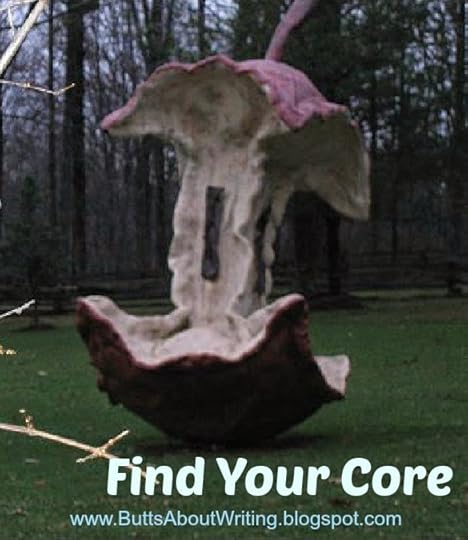 I recently wrote a "new" story that is getting some great attention. I put "new" in quotations because in reality the story isn't a new one for me in the sense that I've been developing this story for around ten years. But I only recently wrote it. When I did actually write it, I've been pleased with the positive attention it has been getting. By that I mean the kind of attention that may result in bringing it to a large audience. But I wanted to stop to evaluate why this story is getting this attention. Obviously I'd like to repeat the experience and create another story or two (or ten) that get positive attention. (Tweetable) So why do I think this story is receiving such attention? I'm so sure in my gut this is the answer: Because this story comes from the core of my being, the core of what I know to be true. In other words, this story required me to write from my core message.
I recently wrote a "new" story that is getting some great attention. I put "new" in quotations because in reality the story isn't a new one for me in the sense that I've been developing this story for around ten years. But I only recently wrote it. When I did actually write it, I've been pleased with the positive attention it has been getting. By that I mean the kind of attention that may result in bringing it to a large audience. But I wanted to stop to evaluate why this story is getting this attention. Obviously I'd like to repeat the experience and create another story or two (or ten) that get positive attention. (Tweetable) So why do I think this story is receiving such attention? I'm so sure in my gut this is the answer: Because this story comes from the core of my being, the core of what I know to be true. In other words, this story required me to write from my core message.There are stories that are created just for the sake of telling a story, to entertain. But a story from your core message goes deeper. (Tweetable)
Defining What I Mean by "Core Message"
I so remember where and when this idea became solid for me. The idea of it floated in the back of my mind, and I think that's true for every writer. But it was when I attended the Act One Writing for Film & Television Program* in 2010 that co-founder Barbara Nicolosi put it into words. She not only presented the idea to us but also challenged us to create a story from our core truth -- a credo from our life -- and present that story to the class before we left that program.
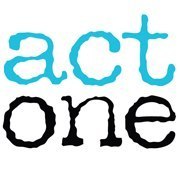 Act One trains Christians for write for film and TV
Act One trains Christians for write for film and TV in order to influence film and television
for Jesus Christ.Barbara called it our "Credo story." I'm calling it a "core message." You may have another name for it. I can't remember much more about how Barbara explained this, so from here on this idea is filtered through my own thoughts and understanding.
But I do remember that I knew immediately what mine would be because I had the "credo" or core message in my heart. I already knew it. I was working to build a story to express it. I just was still learning how to structure a story to work out expressing it.
What Barbara called a "credo" I'm calling a "core message." It is a deep truth from your life that you know in the depths of your heart to be true. (Tweetable) I'd say it's most likely something you've learned through the hard knocks in life. It didn't come easy. (If it did, it's more a cliche everybody already knows.)
Mine was a lesson I learned, a truth that came from hard places and tragedies in my life. I lived it. I learned from it. I grew from it. And I found a truth that helped me when I lived it. That truth has become part of my core being. And I believe that our core messages can help others in the same way they help us -- if we'll share them.
Our core messages may be hard to share because they are so deeply personal. They are hard-fought and hard-won. But they are truths of life. (Tweetable) And that means they apply to others, not just to us.
Core messages are also positive in nature. At least I demand mine to be, because there's no sense in taking an audience to a negative place and leaving them there. If a core message is negative, then you haven't lived through to the positive outcome yet and it's too soon to try to share the message. (Tweetable)
So the question is, how do you come to your core message?
*If you apply to attend Act One, please note on your application that you heard it from me, Dianne E. Butts. Act One would want to know. Thank you for remember me when you contact them.
How to Discover Your Core Message
You may know yours immediately. You may already have lived it and discovered it and stated it in words that you know and remember in your heart. Now is the time to write it down.
If you aren't to the place where you can write it down, then I'll warn you it may be harder than you think. (Tweetable) But you can:
Brainstorm. Collect words that express your core message. Work until you can form a sentence. Don't stop there, but massage and tweak the message until you know that you know that you know it is hitting the target exactly.
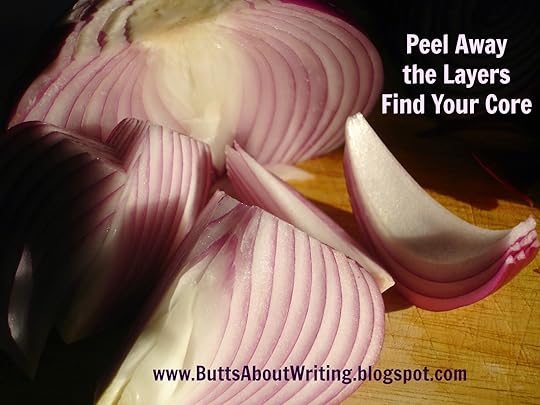 Mind Map it. Use a large piece of newsprint. Write your collected words you brainstormed on it and then group other ideas around each word. The purpose is to get to the point where you can articulate your core message in a sentence.Articulate it. Write it down. Make it a statement. A Credo statement. This is much like writing a Thesis Statement which I wrote about in my December 2014 article. A Thesis Statement is any core message (even an assigned message) you want to express in an article or story. A Core Message statement is a truth or deeply held belief from your own life.Give yourself permission to own more than one Core Message. (Tweetable) I find if I limit myself to
the
core message, or
one
core message, I then have this battle raging about which one is most important. As if I only get one! No, you can have more than one. Just pick one for each story. Articulate it. Write about it, whether in fictional story or in nonfiction memoir or other. To write another story, pick another core message.
Mind Map it. Use a large piece of newsprint. Write your collected words you brainstormed on it and then group other ideas around each word. The purpose is to get to the point where you can articulate your core message in a sentence.Articulate it. Write it down. Make it a statement. A Credo statement. This is much like writing a Thesis Statement which I wrote about in my December 2014 article. A Thesis Statement is any core message (even an assigned message) you want to express in an article or story. A Core Message statement is a truth or deeply held belief from your own life.Give yourself permission to own more than one Core Message. (Tweetable) I find if I limit myself to
the
core message, or
one
core message, I then have this battle raging about which one is most important. As if I only get one! No, you can have more than one. Just pick one for each story. Articulate it. Write about it, whether in fictional story or in nonfiction memoir or other. To write another story, pick another core message.Develop Your Core Message Into a Story
Whether you're writing fiction or nonfiction, short pieces or long, you can develop a meaningful piece of writing out of your Core Message. (Tweetable) Please understand when I use the word "story" here, it could mean either fiction or nonfiction.
For mine, I wanted to express my "Credo Story" in a long story, meaning a novel, a feature-length screenplay, or both.
So I wanted to build a fictional story around my Core Message to express that message. This is where learning about story structure really helped me. In order to build your story around your core message, think about these points:
Create a story that expresses all sides of the issue involved. (Tweetable) Doing so allows you to show what happens when life is lived in contradiction to your core truth.Develop story lines that look at the issue from all sides. This gives your story conflict in different views.Use these different views to create "B stories," which are subplots.
In my opinion, as writers we don't just write a story. We have to build a story. We build brick upon brick. We journey through life step after step. We build or develop a story in the same way. (Tweetable)
Let it percolate. Let your story cook long enough to be fully cooked. You can't rush this anymore than you can rush growing up. You can only "rush" the expression of it by forcing yourself to do the hard part of articulating a fully-cooked core truth. If you never sit down to do this hard work of putting it into words, it can cook forever and you still won't have your core message in a concrete form. It will be there, but it will be in the mush that's cooking.
Tips for Developing Your Core Message StoryAlong the way of my own writing journey, I've picked up some tips I've learned from mentors. Let me share some with you:
Don't be afraid to say it out loud in your story. I've often heard or been taught in workshops or writing articles that we should not start with a message. I think that's nonsense. (Tweetable) If we want our writing to be meaningful where else would we start? (For contrast, I've heard over and over in workshops and such we should start with an interesting character. Fewer teachers allow us to start with an interesting plot.) I say, start with something you really want to say. A core message.Don't be so subtle no one "gets it." Again, we are told to keep it subtle, but from what I've seen subtlety often means the message is either missed or misunderstood. (Tweetable) I'd rather we simply state our message outright. Done well, it works.Don't be preachy. The above cautions are so we don't come off as "preachy." Of course we don't want to be preachy. That turns off an audience. I'm sure you can figure out for yourself what preachy is. You already know not to do that. Sometimes we have to start preachy and then work through it to find a way to work out of it while leaving the message. It can be done. Take careful steps to make sure your final product is not preachy. (Some will call you preachy even when you're not.)Let a character state your core message at the beginning. Besides Act One, I've attended many other screenwriting and story-building workshops. I remember in a screenwriting class taught by Dr. Ted Baehr that he encouraged us to go ahead and state the theme (I consider that our core message) outright and up front. That is the direct opposite of what I've been taught elsewhere, but I agree with this! Ted taught that in movies, a character (often not the main character) states the theme of the movie or story in the beginning of the story. (Tweetable) I'd never notices that. But when I did, I then saw that the story develops and "lives out" that theme, and at the end we come back around to that core message, which is now a "truth." Watch for this the next time you watch a well-written movie.Don't be afraid to have an agenda. Again, this is from Ted Baehr. Again, this is the opposite of what we usual are taught. However I remember him encouraging Christian writers to go ahead and have an agenda. He reminded us that everyone else in Hollywood has an agenda! Christians can too. (Tweetable) Others are not afraid to let their agenda be known. Christians can too. So go ahead and have an agenda...and let it be known in your story. This is not wrong. This is, instead, freeing.
Core Messages Reach the Heart of Your Audience
I believe writing from my core message produced a story that is reaching hearts on a deep level, and that is why it is gaining positive attention from people of influence. (Tweetable) There are stories that are written solely to entertain. But stories from our core, from the deepest part of our heart, that speak the deep truths we've learned from the hardest places in our lives, hold truth and meaning that connects with other people in a way that is far beyond just entertainment.
Stories from our Core not only reach hearts and minds, they change hearts and minds. While an audience may not be able to understand why some stories stick with them, hold onto them, and will not let them go, it is because that story is burrowing deep into their souls. (Tweetable) That causes change. That is what story, in its true purpose, is for.
That's the kind of story I want to write. Again and again.
Please Note...
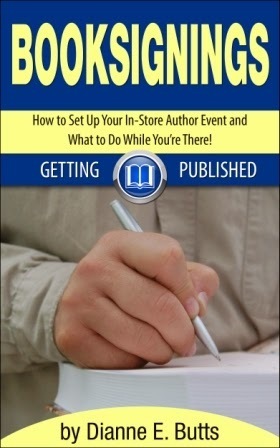
New E-Book! Check out my newest e-book coming soon. If you have a book out, or plan to, you'll want to find ways to let people know your book exists. One great way to do that is to hold a book signing at a book store. That can be intimidating...until you do a few. In this new e-book I share what I've learned, what I've done right and wrong, and how to make a book signing work for you.
Releasing soon. Pre-Order yours now here:
Book Signings: How to Set Up Your In-Store Author Event and What do Do While Your're There!
Colorado Christian Writer's Conference. It's coming soon! May 13 - 16. Sign up now!
Published on April 01, 2015 03:00
March 1, 2015
Gleaning New Writing Projects from What You've Planted and Harvested in the Past
 Gleanings!
This month "Gleanings" is on my mind. There's a reason for that.
Gleanings!
This month "Gleanings" is on my mind. There's a reason for that.On my other blog I've been studying and writing about the "Shemitah." I'm currently reading a nonfiction book about it titled The Mystery of the Shemitah by Jonathan Cahn.
I know what you're thinking: "What the heck is the Shemitah?!"
I'm so glad you ask. The Shemitah is a year-event and also a day-event. The Shemitah is the 7th year in a 7-year cycle on the Jewish/Hebrew calendar. And for those Jewish people following the Old Testament regulations, they let the land rest through the 7th year or the Shemitah year. Just as in the weekly calendar God instructed one day of rest per 7-day week, in the same pattern He instructed them to let the land rest through the seventh year in a 7-year "week" of years, Of course this also meant the people would rest through that year because they did not work the land. But they still had to eat, right?
What do they eat? Whatever grew. On its own. The gleanings.
They still had to do some work because they had to go out and gather the gleanings, but they do not work the land and all the land belongs to all the people to glean wherever they want to.
The whole Shemitah is really an exercise in faith. The Jewish people had to believe that God would provide for them during that year...and the next until they planted and another harvest came in.
The last day of the Shemitah year is also an event. At the end of this day, all the debts are forgiven. It's a national financial re-set. Whoever owes money is set free from that debt. And whoever is owed money releases it. It's an object lesson of how the Lord God releases the sin-debt of those who trust in Him and He gives us rest. The word shemitah translated means "the Lord's release."
Did you know we are currently living in a Shemitah year? As a matter of fact, because the Jewish calendar begins in the fall of the year (last September) we are almost half way through the Shemitah year, which will end Sunday, September 13, 2015. The exact mid-point of this Shemitah year is March 20th, so it seems appropriate to talk about the Shemitah and gleanings this month. (Plus, I only just now thought about applying this to my writing.)
Gleanings for Writers
Okay, I know what you're thinking: "Enough with the Bible lesson. What does that have to do with us as writers?"
My study of the Shemitah caused "gleanings" to be on my mind. Suddenly I realized I already am gleaning in my writing. (Tweet that!) But it also gave me an awesome idea to glean another project from my past writing. (Tweet that!) Let me explain, and then we'll toss around some ideas for how you might glean new writing projects from what you've already planted and harvested in the past. (Tweet that!)
Turn Gleanings into E-Books
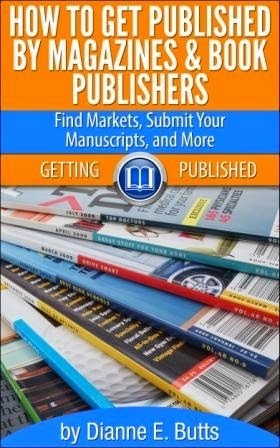 How to Get PublishedWhen I thought about gleaning in my writing, I realized I already am gleaning with my series of "Getting Published" e-books I'm releasing. You've already seen two of my titles that have released.
How to Get PublishedWhen I thought about gleaning in my writing, I realized I already am gleaning with my series of "Getting Published" e-books I'm releasing. You've already seen two of my titles that have released.Glean from a PamphletThe first e-book I made, "How to Get Published," was gleaned from a pamphlet I wrote back in 2003, printed on 11 x 17 paper, folded as multi-page pamphlets, and sold at writers conferences. I took the same information, updated it, and released it as a Kindle book last year. It continues to sell well on Kindle.
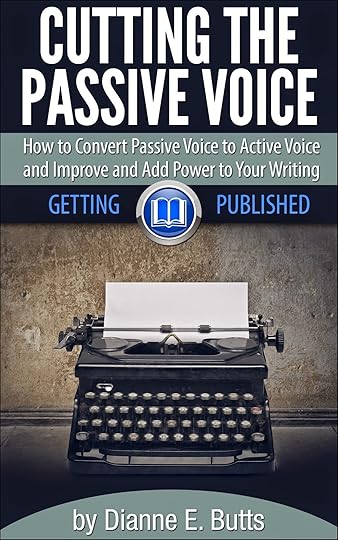 only $.99
only $.99Cutting the Passive VoiceGlean from an ArticleThe second e-book, "Cutting the Passive Voice," came out a few months ago. The information for this little Kindle book was gleaned from an article I wrote back in the '90s. It was published a few times in small Christian writer's magazines. It's still good and helpful information and I wanted to share it with more writers and make it available to a much larger audience. I still owned all the rights to it, so I renewed and refreshed it, added a little more information, and formatted it into a Kindle book. It's been selling quite well since its release, which is exciting and encourages me to do more.
Glean from a Workshop You TeachYou may remember I ask through a survey which e-book you'd like me to create next and I gave three options. Here are the results so far:
Ten Tools for Marketing Your Book - 83% of votesThe Shape of Story: How to Shape your Novel's Story to Make a Great Screenplay - 17% of votesQuery Letters: How to Write the Query (and Cover) Letter You Dread to Magazine Editors and Book Publishers - 8% of votes
You can vote for more than one which is why they add up to more than 100%.
For the first two I will glean material from workshops I teach on those topics. The project on Query Letters I will glean from another pamphlet I wrote back in 2003.
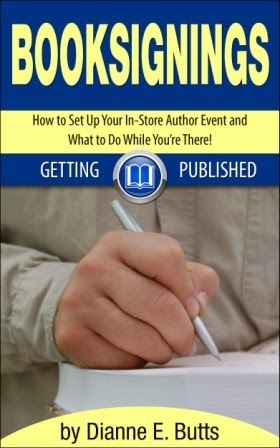 Book Signings
Book SigningsPre-Order now!Glean from a BlogWhile I waited for the survey results to come it, I've been working on another e-book. Book Signings: How to Set Up Your In-Store Author Event and What to Do While You're There! contains a ton of information I gleaned from three different posts on this blog.
While the material is already available for free here on the blog, I feel there's value in gathering it all together into one product for easy access instead of the reader having to hop around searching on this blog. Besides, I'm sure there are a lot of readers who don't even realize this information is available here so they don't know to go searching for it. Plus, readers can keep the e-book handy on their e-reader for easy reference when needed. Furthermore, I believe the e-book will reach a whole new audience of authors who can use the information but who don't even know about this blog. Therefore it may even bring new readers to the blog.
This e-book isn't completely ready to go at this date, but it is available for pre-order right now. That means you can order it and you will receive it as soon as it releases.
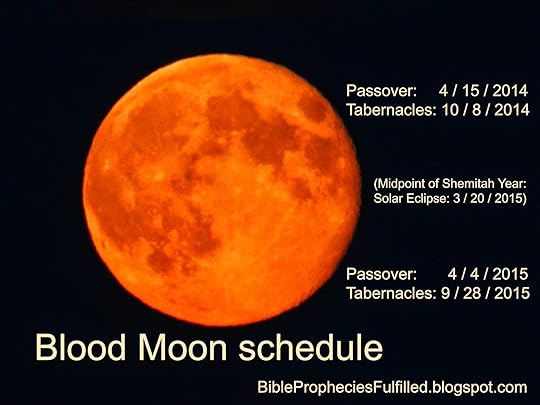 What has me especially excited right now is that while I was thinking about the Shemitah, and while I suddenly thought to apply "gleanings" to my writing, I realized I have a TON of information on my other blog about the Shemitah, the current tetrad of lunar eclipses (being called the "Blood Moons"), the 7 Feasts of the Lord on which these eclipses are falling, the solar eclipse on March 20 at the mid-point of the Shemitah year, and so much more along with the spiritual and prophetic meaning of it all. Again, all this information is spattered through many posts over the past year on my Bible Prophecies Fulfilled blog. So why not gather all of that information into an e-book?!
What has me especially excited right now is that while I was thinking about the Shemitah, and while I suddenly thought to apply "gleanings" to my writing, I realized I have a TON of information on my other blog about the Shemitah, the current tetrad of lunar eclipses (being called the "Blood Moons"), the 7 Feasts of the Lord on which these eclipses are falling, the solar eclipse on March 20 at the mid-point of the Shemitah year, and so much more along with the spiritual and prophetic meaning of it all. Again, all this information is spattered through many posts over the past year on my Bible Prophecies Fulfilled blog. So why not gather all of that information into an e-book?!Again, this is a ton of writing and research I have already completed. I can organize all this information for easy reading in one place so readers can find it easily and keep it on their e-reader for easy access. I can reach a whole new audience. This will give me another income stream. And I can bring readers to my blog who don't know about it right now. Why didn't I think of this e-book before?! You can bet I'll be at work on it to get it out as soon as I can.
What Do You Have to Glean?So the question for you is, what material do you have that's already written that you could re-purpose into a Kindle e-book and share with the world? (Tweet that!) And it doesn't have to be material that has already been published. What about that project of your heart that never got published? You can make your material available on platforms other than Kindle through Smashwords.com. I learned how to format for Kindle by printing out their instructions. It's not that hard. In fact, I put those printed instructions in page-protectors and in a small notebook and I refer to them and walk through them step by step whenever I'm making a new Kindle book.
Turn Gleanings into Videos
If you follow my other blog, you saw in my December posts that I created videos for my posts for the Christmas Advent season.
What material can you glean that you can turn into videos? You can take your writing material and tell it to your laptop's camera, edit it on YouTube.com, and upload it to YouTube. Then you can share that video on your blog, your web site, on Facebook, and probably other places I haven't thought of.
When you say it in video, you reach an entirely new audience. Many people don't want to read. They want to see and hear. So glean material from your books, articles, blogs, and more and make a video. Even if you're only reading your article or a section of a book!
I've been asked to make some of my Bible Prophecy Fulfilled blog posts into videos by just reading them. I haven't got that far yet but I'd like to. That way busy people can hear me read my own blog posts while they are busily doing something else.
It works. It's a whole new audience. What material do you have that would make a great video or series of short videos?
Turn Gleanings into Articles
Perhaps all writers have an abundance of material we've gathered and researched for writing projects. What work have you already done that you can glean articles from?
Or, can you take some material you've put into articles and create other material from it, such as an e-book or series of blog posts?
Can you take your fiction and make it into a series of short stories for your blog or a series of short e-books? (Tweet that!)
Turn Gleanings into Books and More
We've talked about gleaning material you've written and creating e-books. But what about print books? Do you have an abundance of material you can gather together and have enough for a print book? (Tweet that!)
You could add more material, if you want. Update it. Freshen it.
What can you add? Maybe add an appendix, list, or chart. For my new Book Signings e-book I added a list I use when preparing for an in-a-bookstore book signing. That list is material that I haven't published before. It's not on this blog. So it's added value to the e-book.
For the e-book on the Blood Moons and all that related information, I think I'll add a Leader's Guide to the back of the book. That will be new material I will need to create, but it will help readers share the incredibly important information in the book. It will make it easier to lead a discussion with a group of interested people.
Maybe you can glean from stories you've written and use them to create a screenplay or take your nonfiction and make a documentary. The ideas truly are endless.
Renew and Release
Take a fresh look at the material you've already produced. Take a special look at the unpublished material you've created that has never found a home to be published in. Review it. Glean from it. Renew and refresh it. Reuse it. Re-purpose it. Then release it to accomplish that purpose for which it was created.
May your gleanings of new writing projects from what you've already planted and harvested in the past provide you with an abundant blessing of new products, new readers benefiting from your work, and new income streams!
Published on March 01, 2015 03:00
February 1, 2015
What are Your Key Words? Communicating Your Writing’s Purpose
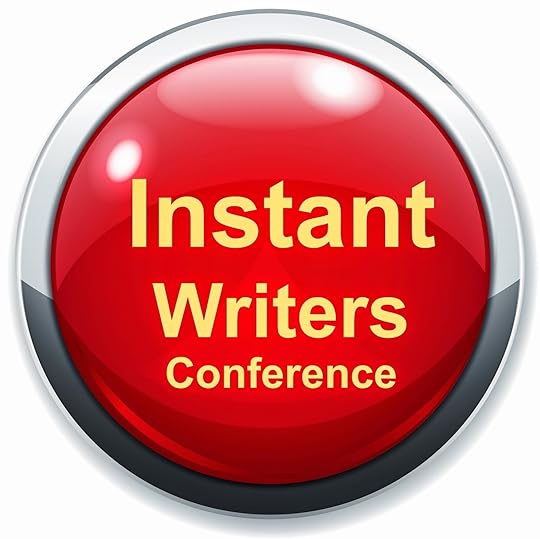 Catch Dianne's "Blog-Plosion" Webinar
Catch Dianne's "Blog-Plosion" WebinarTuesday February 3, 2015!Before I get to this month's article, I have two fun items to share with you!
1.) I'm Teaching a Webinar in a few days! February 3, 7:00 PM Mountain TimeWe're calling it "Blog-Plosion." You'll learn how I exploded the number of page views I'm getting on my new blog, Bible Prophecies Fulfilled, in a very short time. I'll share the strategies I used to get there, including effective blog posts and using social media to send traffic to your blog.
The webinar is Tuesday evening, February 3, 2015, at 7:00 Mountain Time. Cost is $19.99. Proceeds to the Right to the Heart nonprofit. More info and sign up link here:
Blog-Plosion!Hosted by author Linda Evans Shepherd, this webinar is the first from Advanced Writers and Speaker's Association in the new Instant Writer's Conference series!
2.) Top Ten Finalist in the Kairos Prize for Spiritually Uplifting ScreenplaysSecondly, I'm very pleased to be one of ten top finalists in the Kairos Prize for Spiritually Uplifting Screenplays! Here you can see:
the top 10 Finalists announced for the 10th Annual Kairos Prize for Spiritually Uplifting Screenplaysthe announcement of the 50 Semi-Finalists announced in the 2015 Kairos Prize for Spiritually Uplifting Screenplays
It is really an honor to be listed among these screenwriters and I congratulate everyone who made the list. The top three winners will be announce at the 23rd Annual MOVIEGUIDE Awards in Los Angeles on February 6th, 2015.
And now this month's article...
What are Your Key Words? Communicating Your Writing’s Purpose
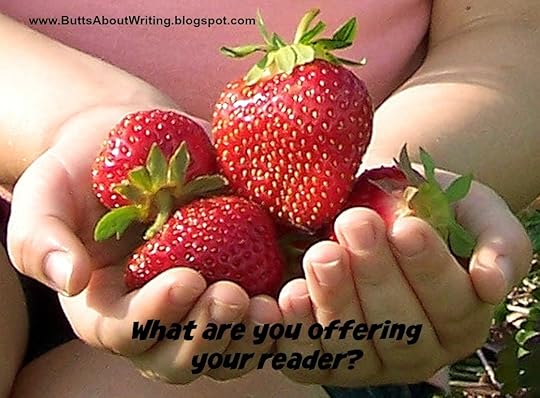 As I've been preparing to teach the webinar "Blog-Plosion," I've been thinking about several people recently who have asked me to look at their blog and give them any input insights I have. Of course every blog is unique and individual, and each one also needs its own critique about its set-up and more. But if I wanted to give one piece of advice to all bloggers, it would be to nail down your Key Words. (Tweet that!)
As I've been preparing to teach the webinar "Blog-Plosion," I've been thinking about several people recently who have asked me to look at their blog and give them any input insights I have. Of course every blog is unique and individual, and each one also needs its own critique about its set-up and more. But if I wanted to give one piece of advice to all bloggers, it would be to nail down your Key Words. (Tweet that!)As a matter of fact, this advice isn't just for bloggers. It's for all writers.
Whether you're writing a print-magazine article, an online article or post, or a non-fiction book, knowing and nailing down your key words is important. (Tweet that!)
But lest you think I'm talking to non-fiction writers only, listen up fiction writers: I believe knowing and nailing down your key words is just as important for novelists and short story writers. (Tweet that!)
Whether you want readers and potential book-buyers to find your blog post or your book to purchase, they need to be able to find you. (Tweet that!) In order to find you, they need to be able to search for you and have you appear amidst all the “noise” of that comes up online or amidst everything else in a bookstore.
How will they know what gift you have for them?
Here's a truth I run into over and over and over again: Beginning and/or young writers think all they have to do is write something great. And then… What? Do expect people to just “find” you?
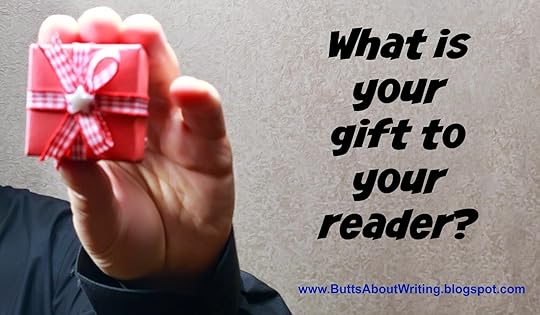 It doesn't work that way. Take Amazon.com for example. There are millions of books available on Amazon. So you write one, even a great one, and make it available through Amazon and… then what? You expect people to not only know your book exists but you expect them to find it? Doesn't work that way.
It doesn't work that way. Take Amazon.com for example. There are millions of books available on Amazon. So you write one, even a great one, and make it available through Amazon and… then what? You expect people to not only know your book exists but you expect them to find it? Doesn't work that way.It sounds basic, but it's true: Before anyone can find your book or article or blog post or other helpful piece of writing, they must know it exists. Then they must be able to find it. These two things don't happen automatically. It takes some strategic effort on the part of the writer.
Now if you get right down to it, some of this should happen automatically. (I'll explain in a moment.) But if you know it and know it well, then you can help it to happen “automatically.”
What I'm talking about, really, is being clear in your writing. Sometimes writers seem to think they need to dance all around their subject without ever really saying what they're talking about!
I don't know, maybe they're afraid of being too obvious or “over the top” as they say in screenwriting. Some writers want to be more subtle and less obvious. I can understand that. But if you're so subtle that nobody is “getting it,” then what's the point?
Your Key Words say what you're talking about
Speaking of dancing around the subject without ever actually saying what I'm talking about. Let me get to the point:
You need to say what you want to say. Out loud. So we can hear it. And whatever it is you're trying to say will include your Key Words.
That's what I meant a moment ago when I said stating your Key Words should happen automatically. When you state out loud what it is you're talking about, using your Key Words should be automatic.
When we were only writing for printed publication, this was important for our audience to understand what we were saying, to be clear. But now that we're writing for the internet, Key Words are even more important. This is how people find you – even if what you want them to find is not online but rather is a book you have for sale.
We are all now writing for the internet because even printed books are advertised on the internet. Most of your platform as a writer is on the internet. Most likely the majority of ways people find you and your written products are via the internet.
How do I find my Key Words?
To find your Key Words, you have to ask yourself some important questions:
Who is looking for what you are writing?
What are they looking for?
What are they going to call it?
Here's the thing: You're writing for a reason. (Tweet that!) Either you're teaching. Or you're entertaining. Or you'e expressing your opinion. Or you're trying to get information out to an audience. All writing has a purpose. (Or why do it?)
So here' what you need to know: Who is it that you want to receive this information?
Be careful with your answer. Examine your answer carefully and consider whether that person you're imagining wants to receive it. They have to want it. You can write material for people because you want them to have the information but if they're not interested in receiving that information, they're not going to. They won't look for it. Even if they find it, they won't want it. So make sure you'e writing something that people want.
That's the person you're targeting.
Now imagine this: Imagine that person needs the information you have written. Imagine they need it enough that they're going to go try to find it. They may go to the bookstore or library and ask for it. But more likely they are going to pull up Google on their laptop, tablet, or phone and search for it. So pay attention! Imagine you're looking over their shoulder as they type something into that search box.
What do they type?
Those are your Key Words! (Tweet that!)
Key Words can be single words or phrases.
If you have what they need, and if you want them to find you and your writing so that you can help them with their need, then you need to use these same Key Words. (Tweet that!) When you do, the search engine is going to link you two together.
Perhaps this links into “branding.”
I won't claim to be any kind of expert on branding, but it seems to me that your Key Words are either virtually the same as your “brand” or at least are very closely related. These Key Words are what you're writing, or at least what this piece of writing (article, book, story) is all about. Your Key Words may be what you are all about.
Okay, maybe they are not what you're ALL about. Maybe it's just what this article or nonfiction book or story/novel is about. But it' still at least a part of what you're about (your brand).
So what do I do with my Key Words?
Use your Key Words whenever you want to draw people who are searching for your "thing" to you. That's pretty much all the time that you're doing business as a writer, isn't it? Whether you’re online or in print.
So use your Key Words in your:
Book titleBook's back cover copyBlog post titlein the Blog post itselfArticle titlesin the Article itselfTweets on Twitter (use a #hashtag)posts on Facebook (use the #hashtag)Google+ (use #hashtag)
There are also Key Word tools online. There used to be lots of free ones but they are harder to find now. Still, if you can find one to use, you can put your Key Words in and it will tell you how effective they are, usually by numbers of people conducting searches using those Key Words. A Key Word tool can also suggest other Key Words or phrases that are similar and may get you even more searches, so you can adjust and strengthen the Key Words you use.
So whatever you're writing now, or whatever you're marketing now, take some quality time to:
consider what your Key Words should be, think about where and how you can use them, put them into your titles and whatever you're writing.
Every piece you write should have Key Words. (Tweet that!) Chances are good you will get more attention for your posts, articles, and books when you find strategic ways to consistently use your Key Words. (Tweet that!)
Related Article:
For more help on keying in to your message, see my article about Thesis Statements in December 2014: Keep Your Eye on the Ball: One Sentence that Can Elevate Your Writing to New Heights.
E-Books for WritersHave you checked out my e-books for writers yet? I now have two:
 How to Get Published! Learn how to sell your manuscripts to publishers.
How to Get Published! Learn how to sell your manuscripts to publishers.E-books (at end)
 Cutting the Passive Voice
Cutting the Passive VoiceWhich e-book would you like me to write next? Please let me know with my easy peasy one-question Survey.
Published on February 01, 2015 03:00
January 1, 2015
25 Free Ways to Market Your Book
 Morguefile.comOne question I get frequently from many writers and authors is, "Now that I have my new book out [or have one coming out], what is the best way for me to market it?" As a matter of fact, I got this very question via Twitter this past month which inspired this blog post. The short answer is, "Any way you can." A better answer might be, "Any way you can that works well with your personality, your schedule, your gifts, etc." But still, we need specific ways to market our books, don't we? It's not that hard. I quickly brainstormed 25 ways to market your book online for free.
Morguefile.comOne question I get frequently from many writers and authors is, "Now that I have my new book out [or have one coming out], what is the best way for me to market it?" As a matter of fact, I got this very question via Twitter this past month which inspired this blog post. The short answer is, "Any way you can." A better answer might be, "Any way you can that works well with your personality, your schedule, your gifts, etc." But still, we need specific ways to market our books, don't we? It's not that hard. I quickly brainstormed 25 ways to market your book online for free.Marketing is all about getting information about your book out there -- and not just once but time after time after time. The truth is, your book is just one of millions. So you must let people -- as many as possible -- know about your book, what it's about, and why they need it. (Tweet that!) Face it, nobody can buy your book if they don't know it exists. Furthermore, most buyers need to hear of a product multiple times before they buy it. (Tweet that!)
Now, with the internet and social media, we can get our names and book titles and information about our books out there more easily than previous generations of writers. There are a lot of opinions about how much and how often we should promote. I think generally the consensus is to market as much as you can without being obnoxious. But then opinions vary widely on what's obnoxious.
I recommend you work through this list and use all the ideas here that work for you. Don't try to do them all at once. Schedule time each week to work on something here. (Tweet that!) Don't fall into the trap of thinking you must do everything. (Tweet that!) Then brainstorm your own list and work through those. Return to both this list and your own frequently because many of these can be ongoing.
Without further ado, here are 25 free ways to market your book (Tweet that!):
1. Landing PageThis may be the only thing on this list that is required. The first thing you need is a place to send people. You can Tweet links and post links on Facebook and do all sorts of stuff, but if you don't have a set place where potential book buyers can go to get more information they want and, most importantly, purchase your book, it's all for nothing. Set up a web site, a blog page, on online store, or an Amazon author page (See #2!), or all of the above, where people can purchase your book. Then with everything you do, share a one-click link to this page or site.
2. Amazon Author PageIn order to have an author page on Amazon, you must have a book available for sale on Amazon. Even if you're a contributor to a book, such as a Chicken Soup book or have contributed a chapter or a story to a collection, you can claim that and get your author page.
If you don't have any of these, get your book on Amazon. The one-time fee is not that much. (It was $25 a dozen years ago when I did it.) If your book isn't ready yet, create a Kindle e-book, publish it through Kindle Direct Publishing, and get your author page.
Every author who has a book on Amazon should have their author page set up. I'm amazed at how many don't. Go to your book's page (or any book's page) on Amazon. Hover your mouse over the author's name (that should be a link) and a box should open. The bottom line of that little box asks, "Are you an author? Learn about Author Central." That last part is a link. Click that and it will take you to Amazon's Author Central where you can open your account (you simply create a user name and password) and then you can enter information about yourself and your book including your bio, your blog and Twitter feeds, upload a book video, and more.
For an example, here's mine: Dianne's Amazon Author Page.
Grab the link to your Amazon author page and use it in Facebook and LinkedIn posts and Tweets. Post it on your web site and blog. Add it to your email signature. Use it as a landing page and send potential book buyers there.
3. BlogA blog is a monster that needs regular, continual feedings, so make sure you can keep it up before you start one. When you do, set up a page with info about your book(s), your book covers, and links to your Landing page or Amazon author page. For an example, here is one of my book pages on one of my blogs: Dianne's Prophecy Fulfilled Books.
Blog on a topic similar to your book, but don't use material from your book. (See #20 about writing articles for more on that.)
Please make sure you enable the Facebook, Twitter, Pinterest, and Google+ share buttons at the bottom of each blog post so visitors can share your interesting posts with their contacts. Not much is more frustrating for me than to want to support other authors by sharing their materials and they've given me no easy way to do so. Yes, I can copy the url and paste it into a Tweet, but I'm busy and I no longer have the time to do that sort of thing. Furthermore, if I'm reading your post on my phone or Kindle, doing all that is such a hassle I'm just not going to anymore. So you just lost sharing your wonderful post with all of my contacts. Bummer. Don't let that be you!
4. Facebook There are Facebook "profiles" for individuals and then there are "pages" for businesses and organizations. Create a "page" for yourself as an author and then ask people to "follow" your page by Liking it.
Be aware that there are new rules for promoting your book on Facebook as of January 1, 2015. Here is an article about that by agent Janet Kobobel Grant of Books & Such Literary Management: What You Need to Know about Facebook’s Latest Revamp.
5. Twitter If you're not on Twitter, you need to be. I get most of my interaction through Twitter. I let thousands of people know about my blog and my books via Twitter. If you need help with Twitter, check out my post "Making the Most of Using Twitter." Especially pay attention to the three parts needed for a great Tweet -- your message, a hashtag, and a link -- and make sure you have those in every Tweet! For your link you're going to need someplace to link to. (See #1!)
6. World Literary CafeThe World Literary Cafe has an amazing number of ways authors can help each other out, including ways to build up your Twitter followers and gain Facebook page Likes. (Tweet that!) Check it out!
They also offer to send your Tweet that markets your book out to their large number of Twitter followers! That's a great way to market your book! To find that look for their "Tweet Teams" page. You'll have to learn the formula they want, write your own Tweet, and wait your turn for your Tweet to go out, but it's worth it!
7. Goodreads You can do a ton of stuff for your book on Goodreads, including free giveaways which gets your book on the radar of thousands of readers, send posts to your followers, and much more. Learn more in my post "Discovering Goodreads."
8. Google+If you haven't yet, you might join Google+. I did this past year and I'll confess I don't know a bunch about using it yet, but I do post all of my blog posts to Google+ (using the share button at the bottom of my blog post) and I know that brings me more blog readers, which in turn gets my books before their eyes. And that's the whole point: getting yourself known so people will want to know more about you ... and then they'll find your books.
9. LinkedInI notice more traffic to my blog posts (and therefore seeing my book covers) when I post a notice to LinkedIn. Sometimes that post is a comment about one of my books (with, of course, a link such as a link to the book on Amazon). To consistently send a post to LinkedIn I use a free account with Hootsuite.com to schedule posts to post automatically in the future. I try to post something interesting once a day or at least a couple times a week.
10. PinterestOn Pinterest you can pin your book covers from online stores, like Amazon, or wherever your books are found. Also pin any articles or guest blog posts you write, author interviews, and posts from your own blog. Create a pin anytime you or your book appears online. Also create boards on topics of your book and pin articles your readers will find interesting.
You can also pin to other people's boards if they allow it. There are boards such as Christian Authors and Christian Nonfiction and Christian Web Sites, so I also pin there whenever I have an appropriate pin.
Note that in order to pin an article with Pinterest it must have an image (photo) with it. This is why you should always, always, always use a photo with every blog post and online article you write.
11. InstagramThis past weekend I heard a tech guy on a radio show state that for the first time the number of Instagram users has now passed that of Twitter. Guess I'd better join Instagram!
I did a quick search the other day and found some articles on how authors can use Instagram to market their books. You might try the same.
I know that IG, like Pinterest, requires a photo for each post. I haven't joined yet because I just couldn't figure out what to take photos of to post, and I didn't know how to make it benefit my marketing efforts (not that it's all about marketing, but at least part of it is). Interestingly only yesterday I saw a photo on Facebook from a friend who is enduring chemotherapy. She posted a photo of her Bible open to where she had a note card with a name and the caption explained she had committed to praying for a friend during each of her 28 chemo treatments. This photo was first shared on Instagram with that awesome message and then sent to Facebook from there. Ah. Now I'm starting to get it!
12. Maximize SEOLearn about "search engine optimization" and then optimize everything you do online. Use your book title(s) and keywords in your blog titles, your YouTube video titles, guest posts, articles, etc. You can learn more about SEO in this post: "7 Keys to (SEO-Successful) Blog Posts."
13. YouTubeI recently learned how to make and edit YouTube videos. I made a dozen of them for the Christmas Advent season for my Bible Prophecies Fulfilled blog. It's not that hard. If I can do it, you can do it. Think of the book-marketing videos you can make! From book trailers to teaching videos about the topics of your books which you can post on your web site or blog (as a vlog = video blog).
My friend author Linda Evans Shepherd makes lots of videos for her chapters in her books.
14. Make a Book Trailer You can use YouTube to make a book trailer and then post it on Facebook and your web site. You can embed your video on your blog in a vlog (video blog) post or in a sidebar (that stays permanently on the side of your blog). You can post a book trailer on Goodreads. You can send the link out regularly in a Tweet.
You can also make a 30 second book trailer for free at Animoto.com. Learn more about that in my post: "Make Your Own Book Trailer - Easy and Free!"
One thing you can no longer do is post your YouTube video on your Amazon page. I don't know why, but Amazon doesn't accept YouTube videos any longer. So you'll have to create a book trailer with a different program for Amazon. I know that Amazon will take a .mov file and you can make those if you're willing to pay a subscription to Animoto, but you can't make a .mov video through the free account.
15. Hold a booksigning This is an in-person event where you can go out and meet people and tell them about your book. I've blogged about how to set this up and what to do when you're there in these posts:
How to Set Up an In-Store Author Event (AKA "Author Book Signing") - Part 1What to Do at Your In-Store Author Event (AKA "Author Book Signing" and How To Make It a Success - Part 2Would anyone like all this information on how to hold an in-store book signing in an e-book? I'm sure I could fill an e-book with info on that!
16. Schedule a Facebook EventWhether you have an in-person book signing event coming up or just want to create some kind of an online special event to market your book, you can post or even host the event on Facebook. On Facebook, go to your author page. Then click on "Events." Then click "Create Event" and fill in the information.
I have two events scheduled you can look at as examples. They might give you ideas. Also, I'd be pleased if you "joined" these events by clicking "Going" and then also "share" them and invite your friends.
Solar Eclipse Virtual Watch Party! - 1st Dark Sun of 2015 will be on March 20, 2015Lunar Eclipse Watch Party! - 3rd of the 4 Blood Moons is on April 4, 2015
17. Create E-booksIt may sound a bit crazy but another way you can market your books is to create e-books. You can create them on related topics of your existing books or entirely different topics. But you can use them to market your existing books by putting an ad about your books at the end of your e-book. On some e-book platforms, such as Amazon's Kindle, you can even include links to your other books on Amazon.
If you make your e-book exclusive to Amazon's Kindle, Amazon gives you certain privileges such as creating free book giveaways or countdown sales, as well as making your book available in the lending library (where you get paid for each library borrow).
However you can forgo those privileges and also publish your e-book on other platforms. I've been looking into Smashwords and hope to get around to trying it soon.
Speaking of e-books, have you seen the series of e-books for writers I'm publishing? The first was How to Get Published for beginning writers. A few weeks ago the second in the series released: Cutting the Passive Voice for only 99 cents. I'm thinking about my next e-book for writers and I have several I could choose from including one based on my workshop "Ten Tools for Marketing Your Book." Please visit my survey to let me know which new e-book you'd like to have next: Dianne's One-Question Survey!
You can keep up with all my e-books for writers by visiting Dianne's Amazon Author Page. Also watch that page for when a coming book is available for pre-release sales. You can also sign up for e-mails from Amazon when I release a new book.
18. Acquire Amazon book reviewsI recently learned that if you get 100 reviews, Amazon will begin featuring your book. It doesn't seem to matter how many stars each reviewer gives, so don't worry if you get less than 5-star reviews.
While a great marketing tool for your book is reviews, I'm not sure how to get that many of them. I wish I had more reviews for all of my books. The one thing I do know is that we shouldn't solicit them. For example it's not proper to promise a free copy of your book in exchange for a review. That's like buying reviews and is frowned upon. You can give free review copies, but there should be no obligation to write a review, much less a positive or 5-star review. Perhaps the best way to accumulate reviews is to simply ask for them? If you know of a good way to get Amazon reviews, please share it with us as a comment below. Thanks.
When you do get a nice review, you can also use it elsewhere -- on your web site or blog's book page or in your email signature -- for book marketing purposes.
19. Regularly offer your expertise and helpWhile we are always trying to get the word out about our books so people will buy them, one way to market is to offer something to your readers without expecting anything back. I enjoy offering help to writers through this blog. And I'm pretty sure you don't mind when I occasionally mention one of my products. Build up good will with your followers and readers, and then they will champion you to their contacts. Offering something of value, like information, without always "selling" also helps us to not always sounds like we're just saying "buy my book buy my book"!
20. Write print articlesBack before internet days, pretty much all we had to read was magazines, books, and junk mail. Then it was common for writers to write articles for print magazines. Now there's so much we do online we can forget there are still print magazines out there that we can write for.
You can write an article on the same or similar topic as your book. Be careful not to use too much material in your book. Most publishing contracts restrict how much you can give away. Why would people buy your book if you're giving the same information away for free? Even if you published your book yourself you might follow the same principal for the same reason.
An example of this is my Bible Prophecies Fulfilled blog. I'm blogging on the same topic as my "Prophecies Fulfilled" series, but I'm not using any of the information from my books. If readers like what they're reading on my blog, they'll get more similar material when they buy my books.
Even if your article is on a topic completely unrelated to your book, you can still market your book through it by including your title and/or web site url (See #1!) in your bio at the end of the article (if the magazine allows or uses one).
As long as you still own the rights to your article, after it's published you can reshaped or repurpose the article as a blog post or even an e-book. My most recent e-book, Cutting the Passive Voice , was originally a magazine article from 1996. I made it into an inexpensive e-book so I could share this helpful information with many more writers for only $. 99.
As a bonus, most of the time you get paid for writing print articles.
21. Write a Guest Blog PostSeek out other bloggers who are interested in your topic and see if they would like a guest blog post. Many bloggers take guest posts. Some just need an occasional break from blogging to take a vacation or meet a deadline. So if you have an idea for a guest post that fits the blog, let the blogger know your idea and politely ask if they would like the post from you. Most will then give you a link to your landing page (See #1!) or allow you to mention your book. Not all bloggers want guest posts so don't feel hurt if they say no.
You might also trade guest posts with other bloggers, allowing them to guest on your blog. Some bloggers create "blog hops" and other events. Doing so can gain you readers from their blog and gain them readers from your blog, which helps you both. And that's the point! Getting your name and book information out to ever more people is the name of the game.
22. Co-op with other authorsWorking together to market each other's books and cross-promote each other can multiply your efforts. Some organizations are created just for this purpose. You might be able to find a group to join or gather some author friends and start your own.
23. Create a newsletterYou can build up a mailing list with a newsletter. People who subscribe will be interested in you and what you have to offer, so the likelihood of them being interested in your book is increased. And of course you can always mention your book and give a link to it (See #1!) in every issue.
I've recently renewed my former newsletter from a few years ago. I'm now using MailChimp,com which is free until I reach a certain number of subscribers. You may have encountered a pop-up subscription box when you came here. If not, find the subscribe box in the upper right corner of this blog and please subscribe! I usually send out a newsletter once a month.
24. Create a surveyCreate an interesting survey that will spark interest about your book or its topic or give you opportunities to talk about your book. I used Survey Monkey to create my one-question survey about which e-book writers would like me to write next: Which E-Book For Writers Would You Want Next? Would you please click there and let me know what your vote is? Thanks!
25. Create a pretty posterA fun and creative way to let people know about your book is to create a lovely poster with an inspiring or important message or quotation from your book. Be sure to include your book's title as the source. You can also add a url in the corner of the poster. (See #1!)
You can then post your creation on Facebook, Twitter, your blog, and web site. Ask your friends to share it via their social media outlets too.
I've used Pick Monkey to create some of these. You can read more about this and find other resources for this purpose here: "Create Your Own Text on Images for Your Blogs and Marketing Your Books."
There you have it. There are 25 free ways to market your book. (Tweet that!)
Let these 25 free ways to market your book be just a starting place. Use your imagination and brainstorm more. I'm sure you can come up with many, and surely some of them will be unique for you and your personality. When you come up with an idea that can benefit others, please share it in the comments section below. Happy book marketing!
Published on January 01, 2015 02:00



